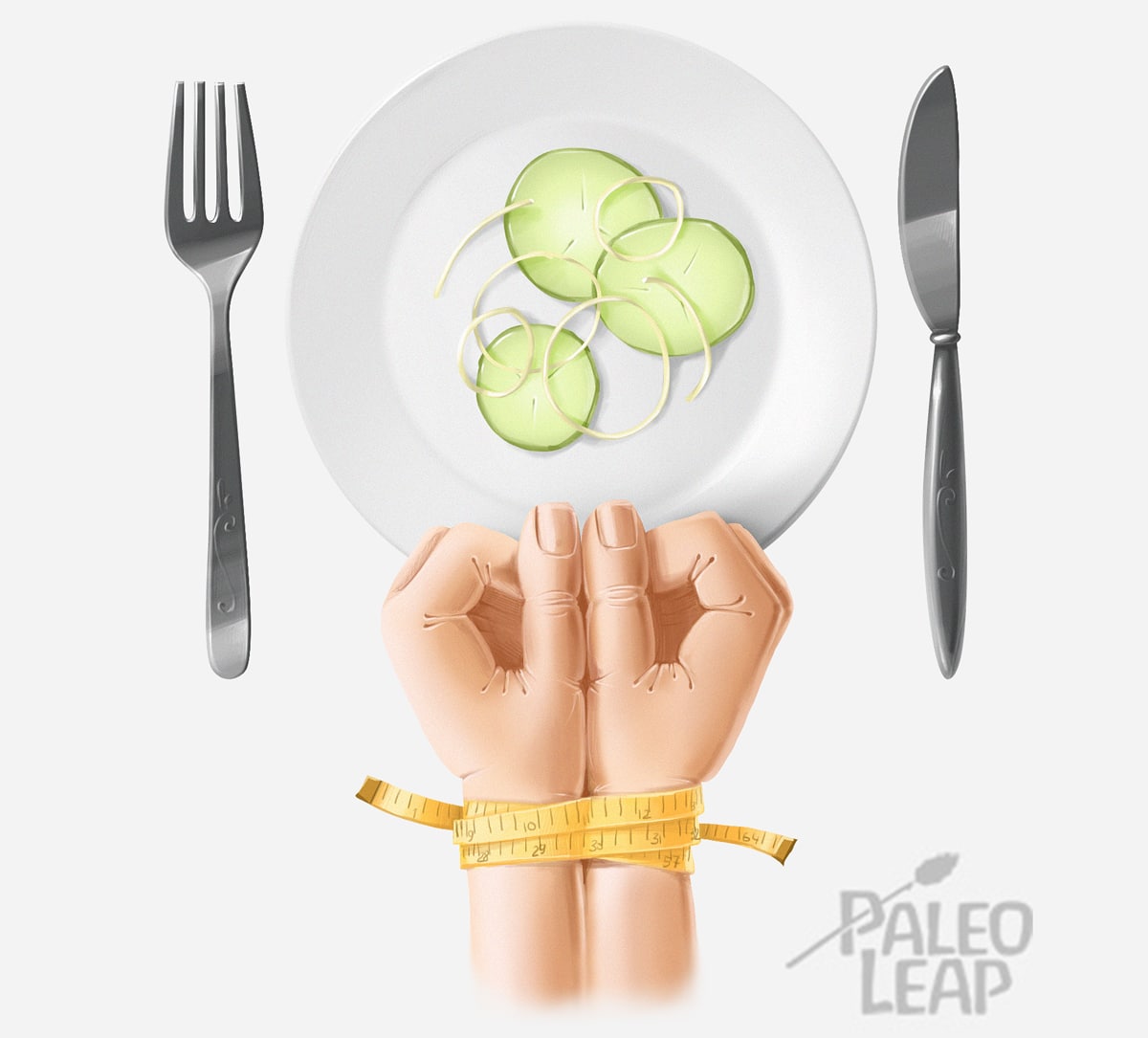If you’re not familiar with the carnivore diet, it’s exactly what it says on the tin: a diet of only animal foods and salt. Some versions allow eggs and/or dairy; others are all meat, only meat, all the time. For strict carnivore, there aren’t any plant foods at all - no vegetables, no herbs, no coffee, nothing. Some people go further and restrict to just one type of meat.
Why would anyone do that? Some people try it for really severe health problems or as a last-ditch weight loss effort. And other people do it believing they have no other choice, but they might not actually need to do it at all!
We've written about the carnivore diet before - that post includes a discussion of the explorer Vilhjalmur Stefansson, who lived for an extended period of time with the Inuit, ate a carnivorous diet, and seemed to be perfectly happy that way. But even though that story is interesting, it doesn’t shed a lot of light on the options that people have today - how can you tell if this way of eating will actually be helpful, or if it’s just too extreme?
Is the carnivore diet too restrictive?

It’s absolutely true that some people have serious health problems that require very restricted diets and extreme lifestyle accommodations. But other people have less complex health problems that respond well to less restrictive diets.
Without denying that some folks are very sick and need a therapeutic diet, healthy humans are very adaptable omnivores and are not “naturally designed” to eat only meat and salt. A diet rich in plant foods is nutritionally rich and valuable for long-term sustainability, and most people can meet their health goals on that type of diet. All the hunter-gatherer societies we know of (yes, even the Inuit!) sought out plant foods as at least a small part of their diet. There is a point where trying carnivore is reasonable - but “I tried the Special K diet and only lost 1 pound, so I need to go full carnivore to have any hope of losing weight” is...not a realistic thought process.
If you’re thinking about trying a totally carnivorous diet, a good question to ask first is: “can I get the same results with less restriction?”
Here are some diet strategies to consider as intermediate steps before resorting to full-on carnivore:
- Ketogenic diet: if your reason for trying a carnivore diet is weight loss or metabolic healing then the main benefit of the diet might actually be ketosis. A ketogenic diet will accomplish the same thing, but with more nutritional variety since you can eat at least some plants (and coffee!)
- Intermittent fasting: this can be combined with keto or with any other diet. Like keto, it helps to mimic a starvation state, which can be therapeutic for some people. (More on intermittent fasting and workouts; intermittent fasting and Type 2 Diabetes; fasting and pain; alternate-day fasting)
- Low-FODMAP diet: if your reason for eating carnivore is that everything upsets your digestion and causes gas/bloating/constipation/diarrhea, look into a low-FODMAP diet or other types of diets that eliminate certain groups of vegetables without totally cutting out all plant foods.
Trying a carnivore diet: understanding adaptation/adjustment symptoms
With any diet change, it's normal to have an adjustment period. If you suddenly increase the amount of fiber you eat, you may feel gassy and uncomfortable. If you were a vegetarian for years and start eating meat, you may feel off until your body starts producing the enzymes you need to digest animal protein again. Transient adaptation symptoms don't mean that a particular diet is bad or even wrong for you, just that it's different.
With a brand new all-meat program, you may experience digestive symptoms and/or the notorious “keto flu” (since most versions of the carnivore diet wind up being ketogenic and most carnivores wind up in ketosis). Keto flu is pretty normal and generally goes away on its own (drink lots of bone broth, electrolytes, and water!) But if the adjustment symptoms never improve, or if they’re totally unbearable, that could be a sign to either look into modifications to the diet or to quit completely.
Trying a carnivore diet: Supplements

A diet can be the only thing that works to solve your most pressing health problem, and at the same time, that “miracle diet” can be nutritionally incomplete for other reasons. To take an extreme example, a diet of only plain white rice would completely resolve all the symptoms of Celiac Disease (because it’s completely gluten free), but it's also severely lacking in protein, fat, and most essential nutrients.
Think of all the foods that healthy hunter-gatherer societies ate. Meat (including every part of the animal), blood, eggs, insects, fish, herbs, vegetables, mushrooms, berries, seaweed, tubers, fruits...relative to that list, eating only meat, salt, and water is extremely restrictive by the standards of human evolutionary biology. Especially if that meat is all muscle meat in the tradition of the American supermarket, it just doesn’t fit all our nutritional needs.
If you’re going to try out a carnivore diet, you should know about the nutrients you’ll probably be missing. Here’s a short list -
- Vitamin C (found almost entirely in plant foods - there are technically some animal sources, but how many people on the carnivore diet are actually eating raw liver to get vitamin C? Chances are it’s not very many. And yes, the need for vitamin C might be lower with low carbs, but it’s not 0.)
- Vitamin E (found primarily in plant foods - this can be a hard one to get even on Paleo; it’s very difficult to find just from meat and eggs.)
- If you’re not eating seafood and dairy, iodine (or iodized salt)
- Electrolytes (sodium, potassium, and magnesium - remember that carnivore is almost certainly going to put you in ketosis, which dramatically increases your need for electrolytes)
- If you’re not eating dairy or bones, calcium (there are lots of non-dairy sources of calcium; the vast majority of them are leafy green vegetables. Bone-in fish or other animal bones would be a good non-dairy carnivore source)
- Folate and magnesium can be difficult on a low-carb diet if you’re not eating plants.
As always, make sure to get high-quality supplements (more on supplement labels and finding the good stuff).
Three questions to ask before you try the carnivore diet

- Do YOU want to do it? Don’t try something this challenging because your friend is doing it and needs an accountability buddy and guilt-tripped you into joining them. Don’t do it because your coworker is doing it. Do it because YOU want to do it.
- Do you have a compelling reason to be this restrictive? Have you tried other, less restrictive options like the ones listed above (keto, intermittent fasting, Paleo, FODMAP elimination, or other gut-healing strategies)? As a side note - if you try keto and it doesn’t work, then you’re already halfway to carnivore, so even if it doesn't work, it's still a step towards a carnivore diet.
- Are you willing to approach it as an experiment, and not a religious conversion? Diet is not a religion. You don’t have to convert and then keep believing regardless of the evidence. After a reasonable amount of time for your body to adjust (say 4-6 weeks at the high end), if you’re not benefitting from the diet, don’t “have faith” and stick it out. Approach it with the mindset that you’re willing to drop the whole carnivore thing if it’s not working. Diet is a tool: try it out, keep it if it works, and try something else if it doesn’t. Bear in mind that your body may change in the future and something that worked well a year ago may no longer work well now.
This all sounds pretty hard on the carnivore concept - because the more significant the diet change, the more important it is to think things over carefully before you commit. It is a big step to take, and maybe it's the step that some people need, but there's no reason to try something like this just because it's trendy or getting a lot of buzz.
Do you love eating nothing but meat? Or did you try carnivore and ultimately decide on something else as your favorite way of eating? Let us know on Facebook or Twitter!





Leave a Reply